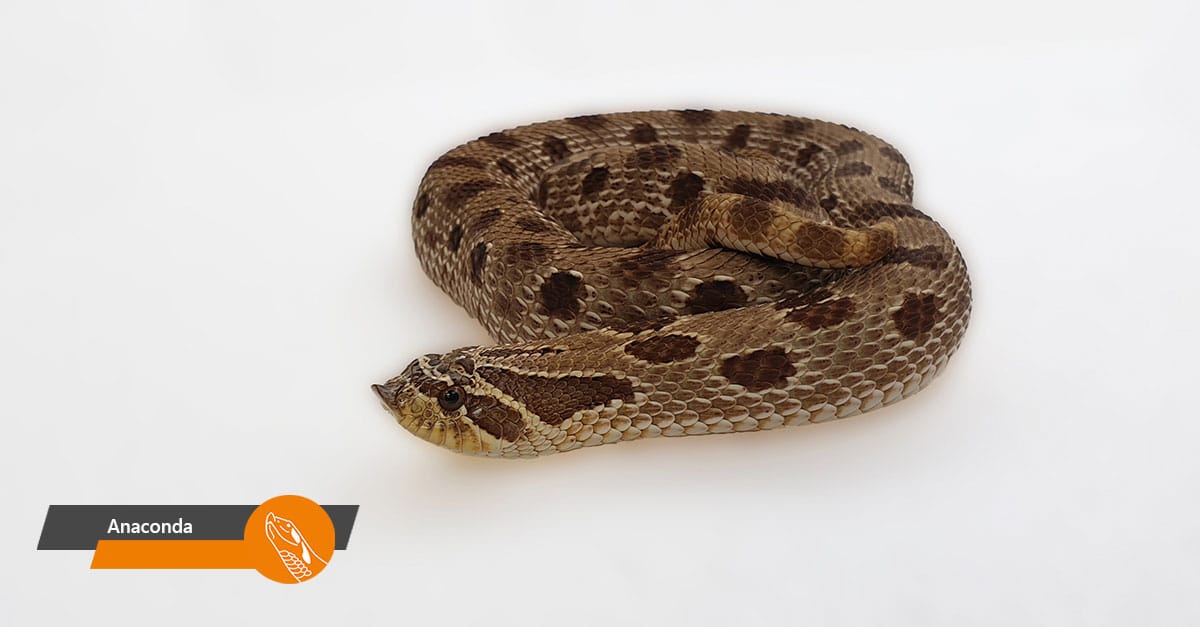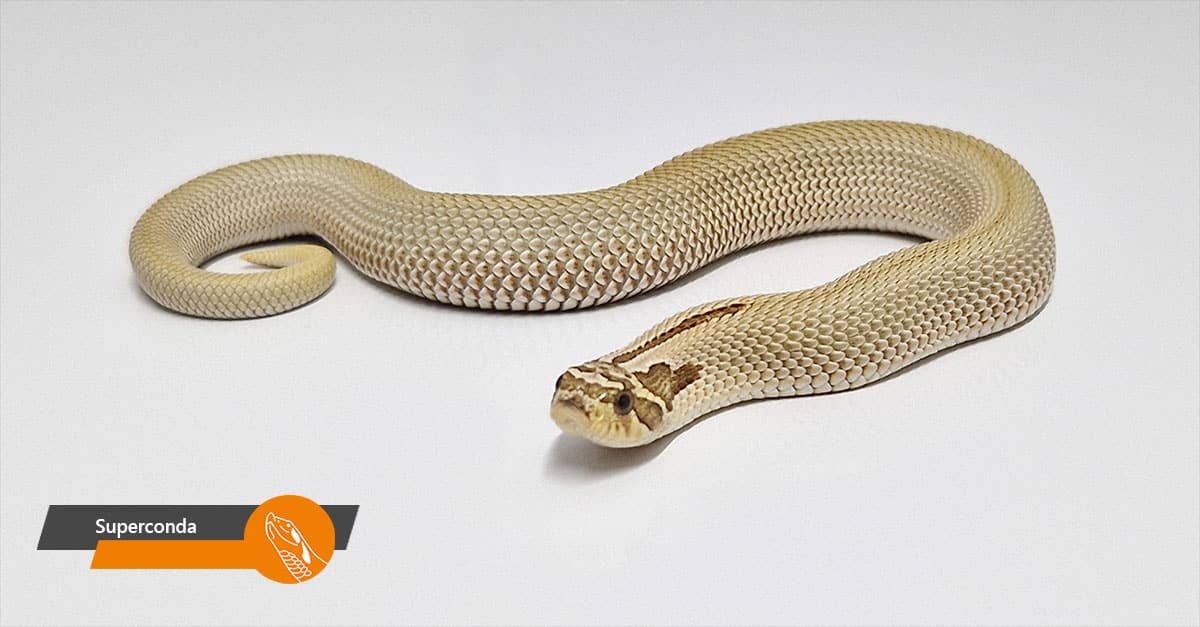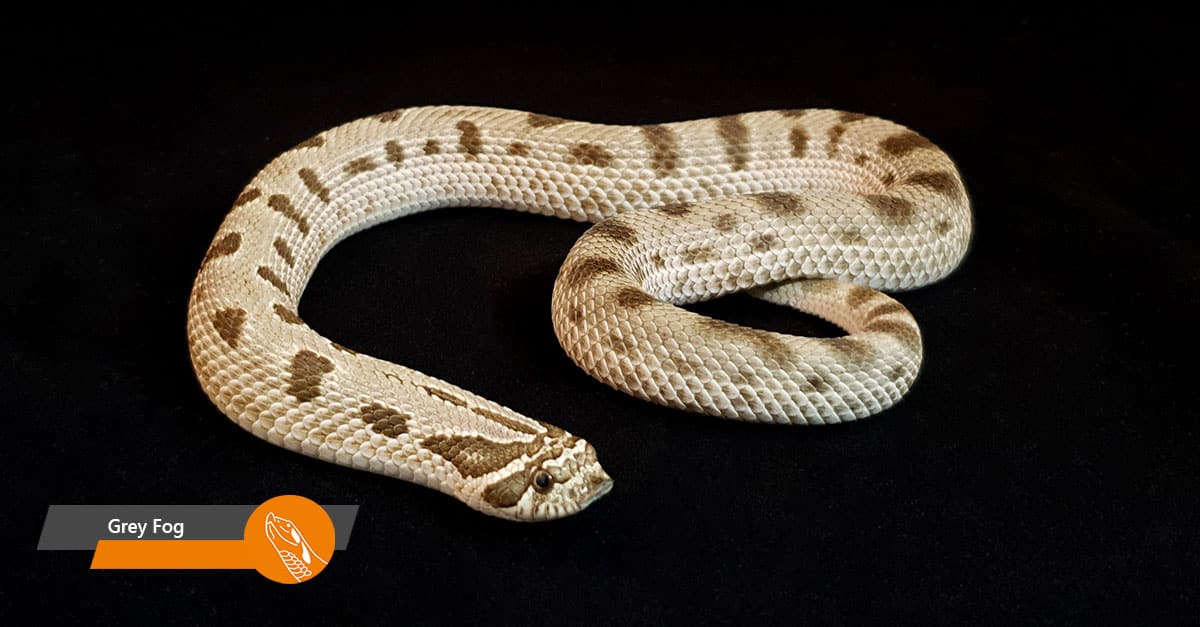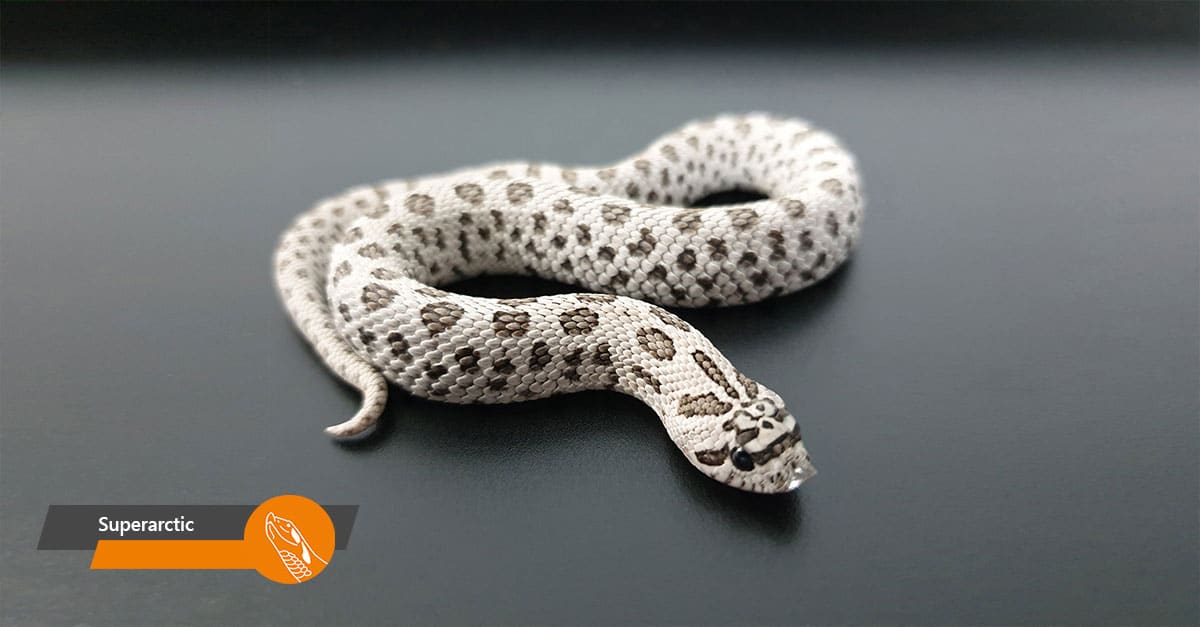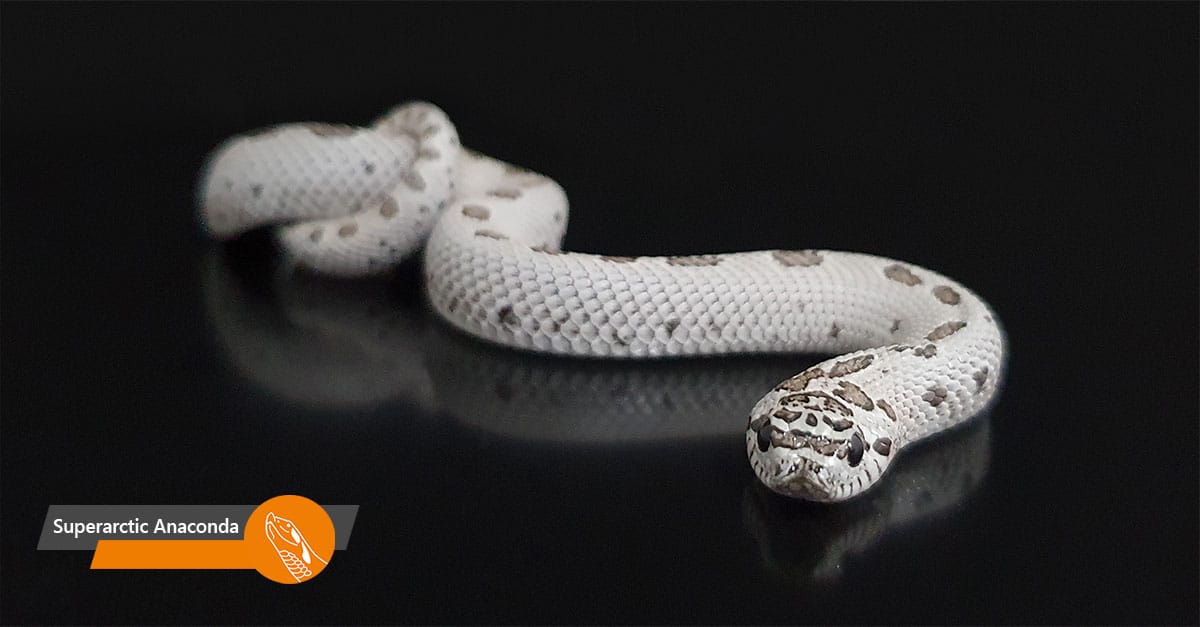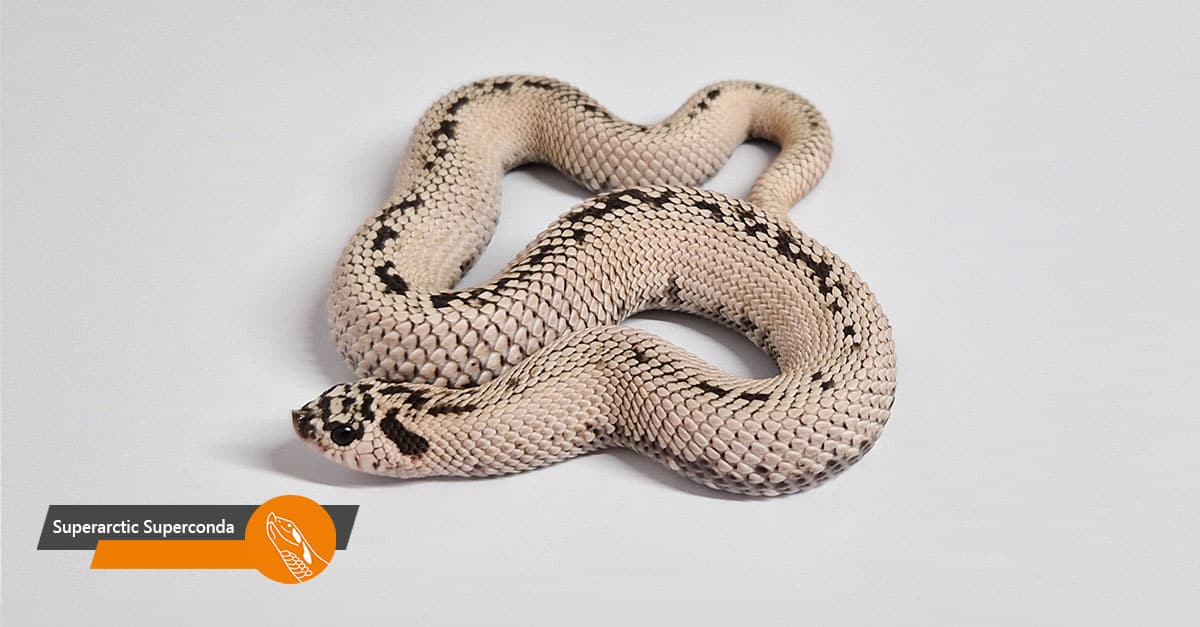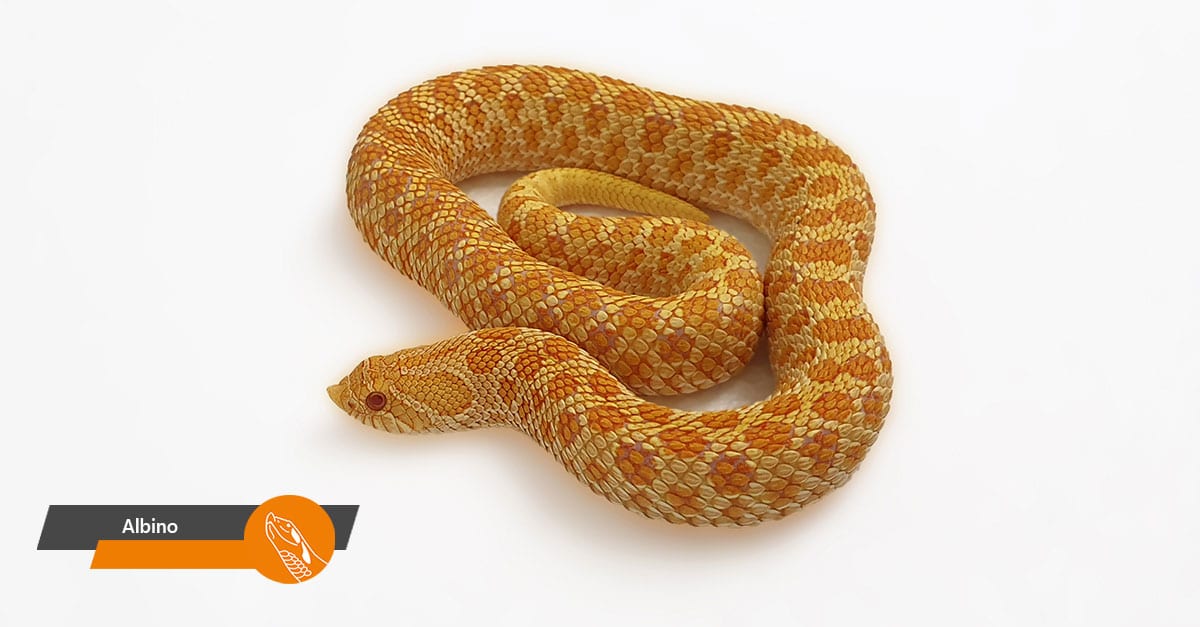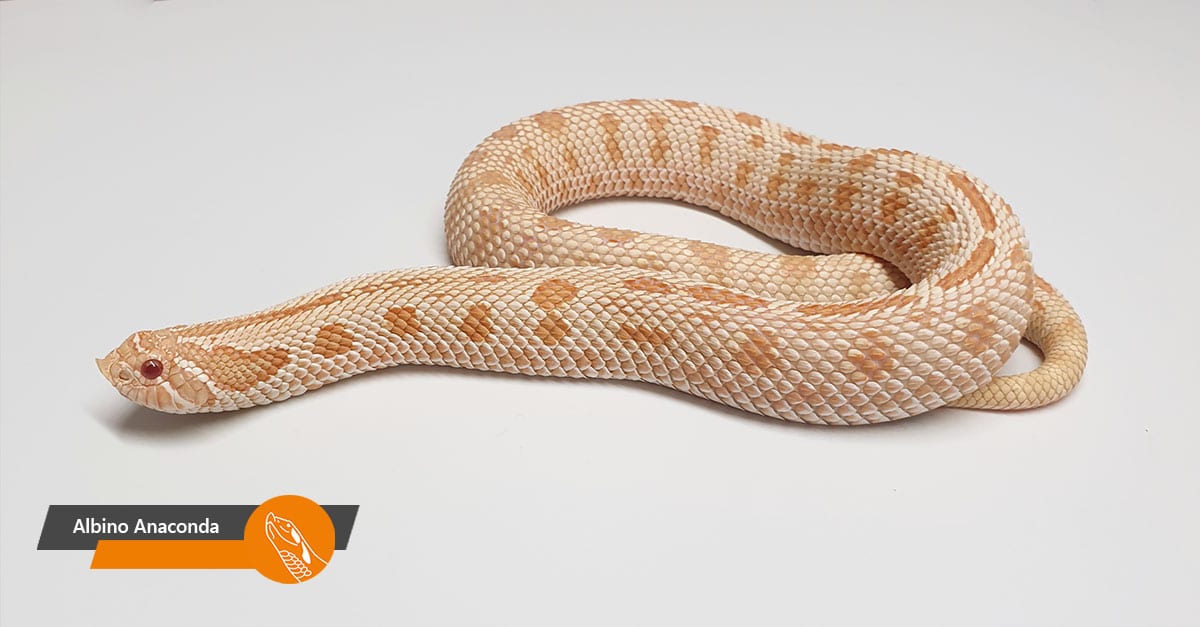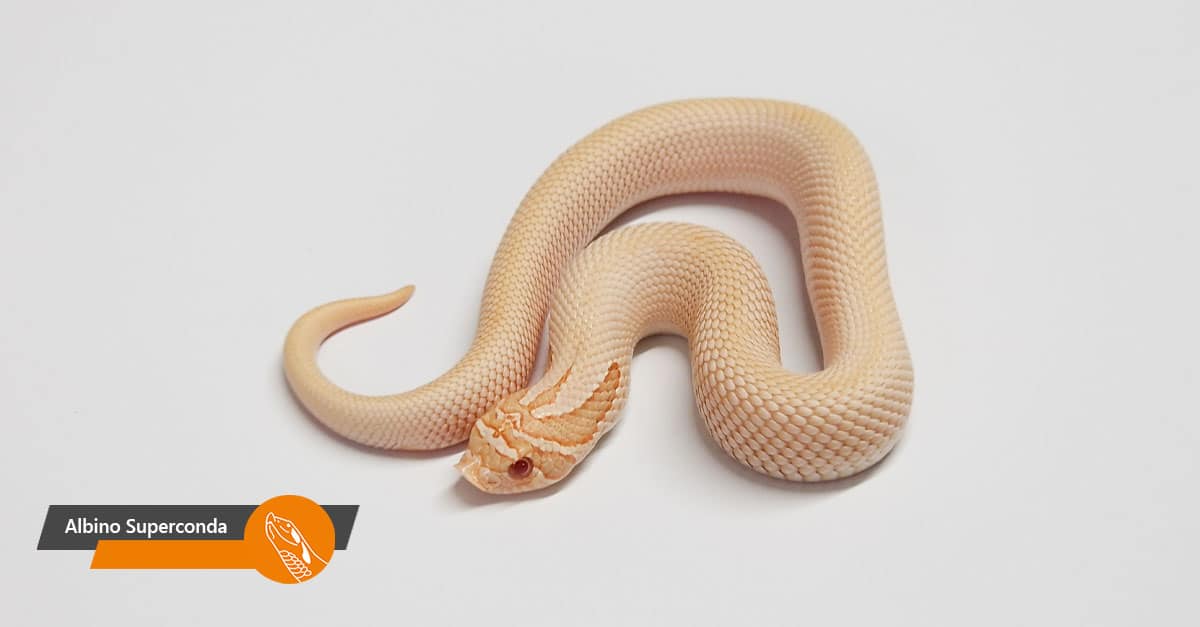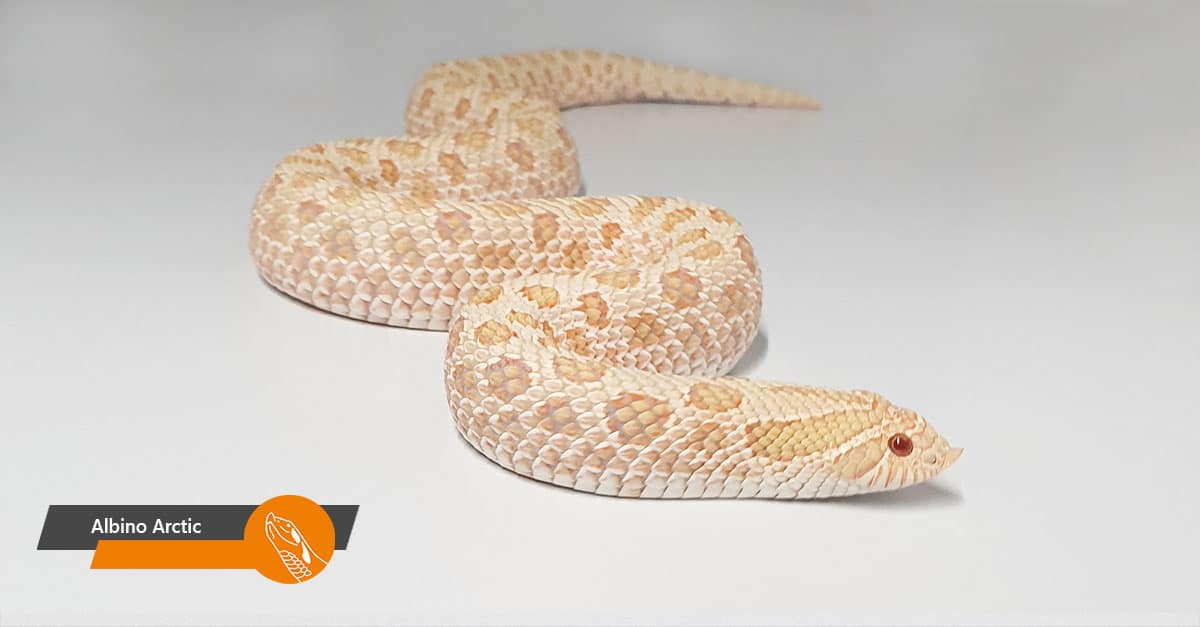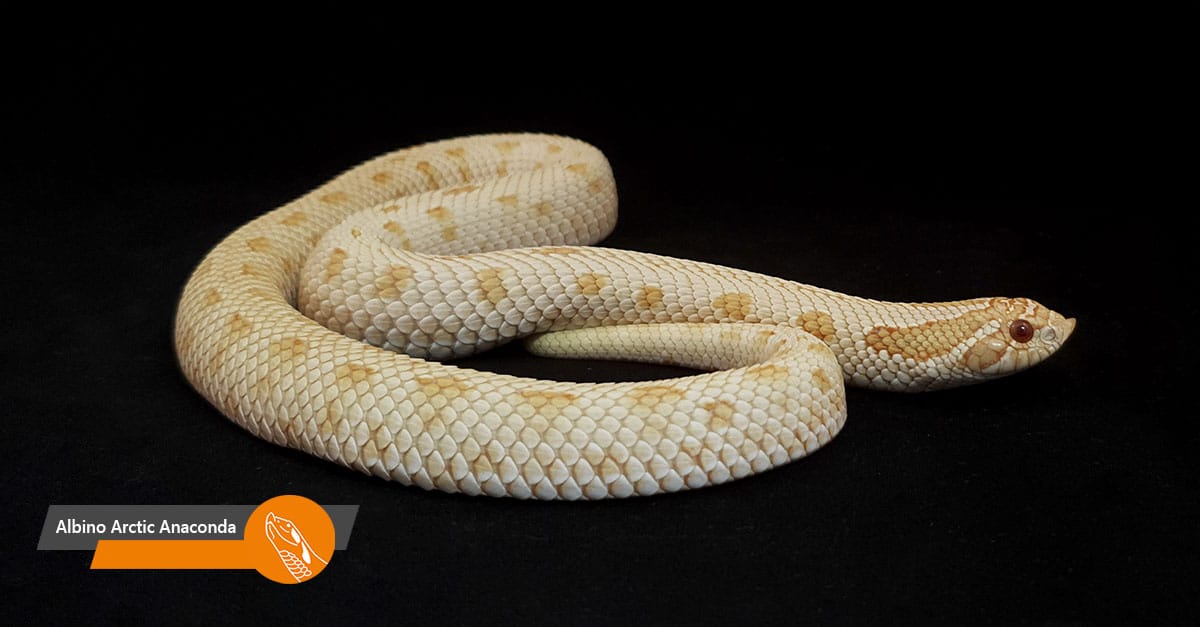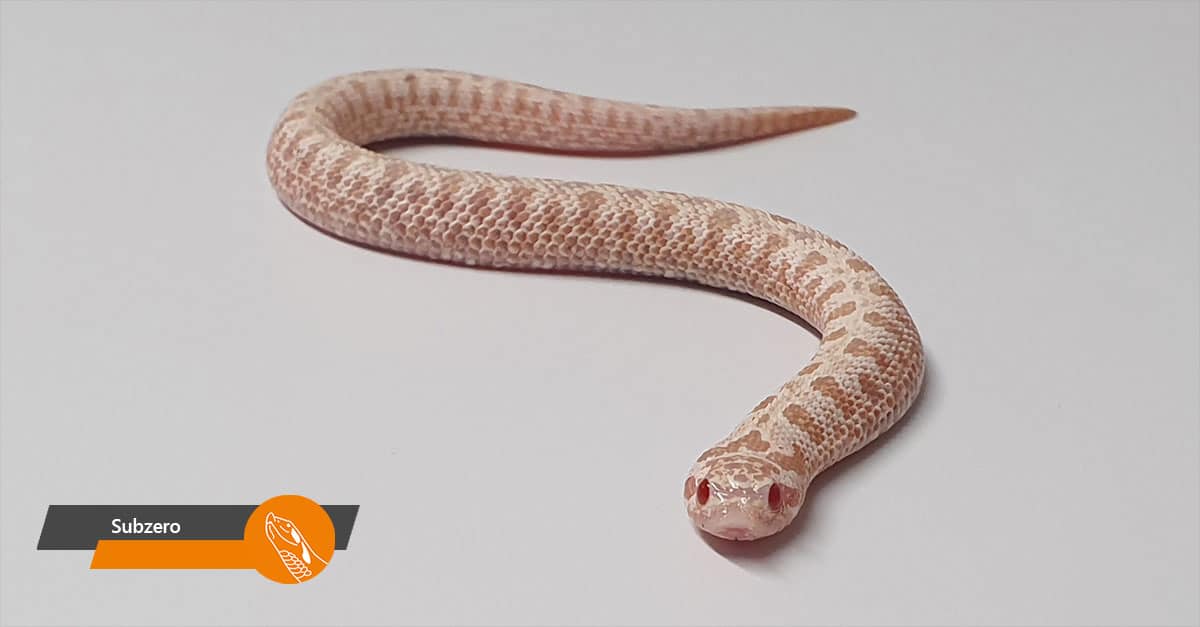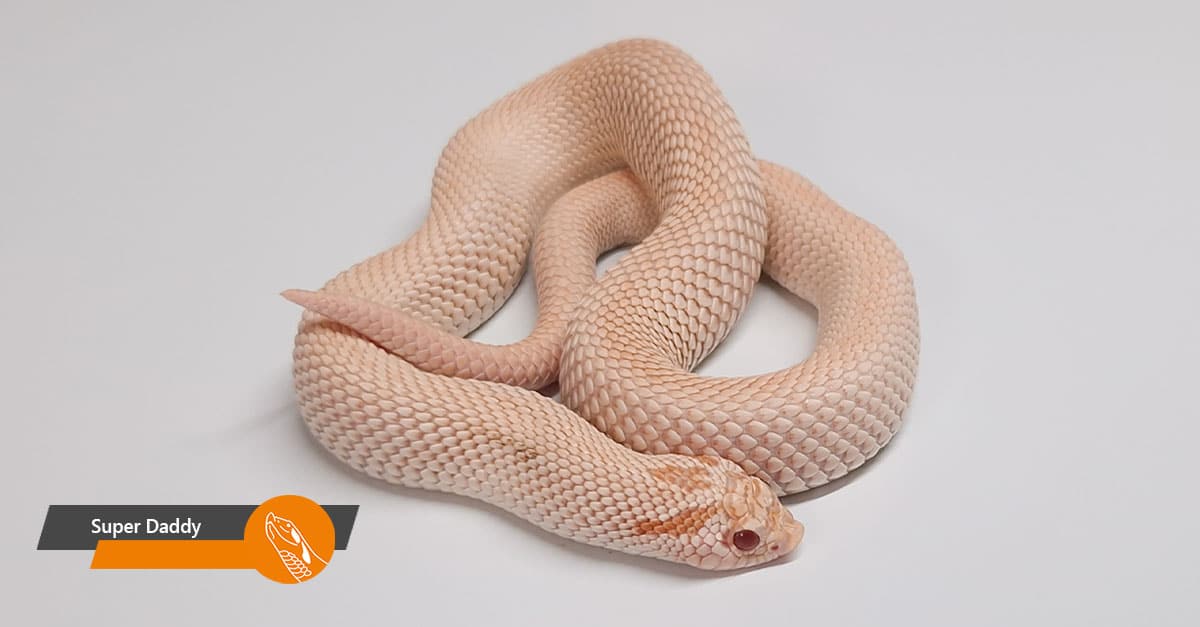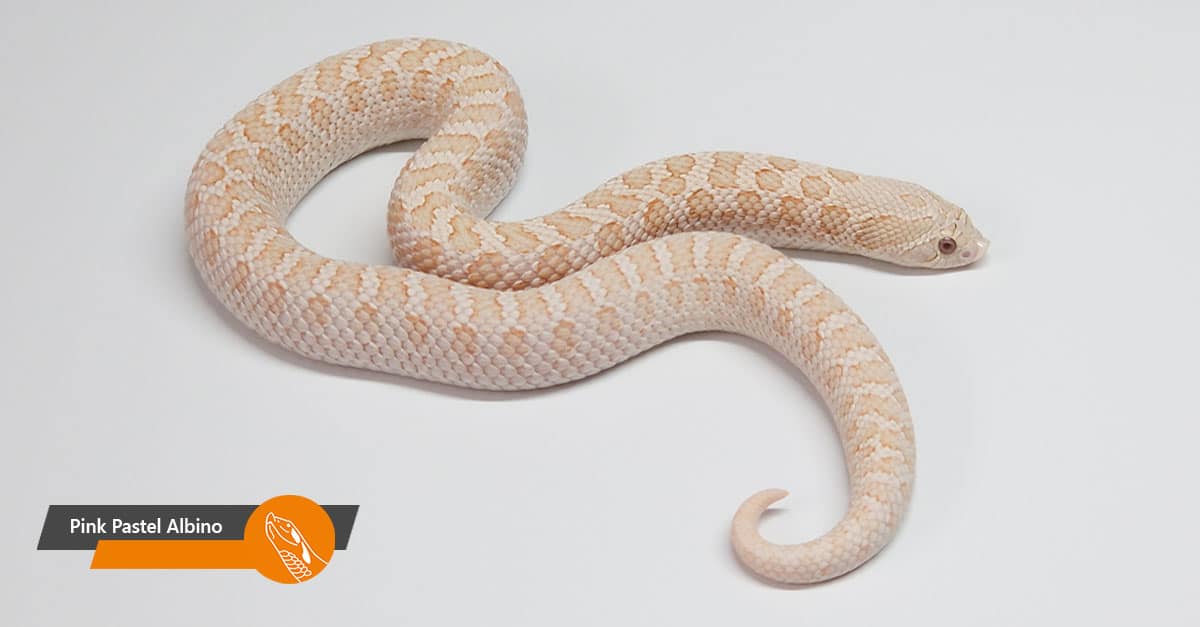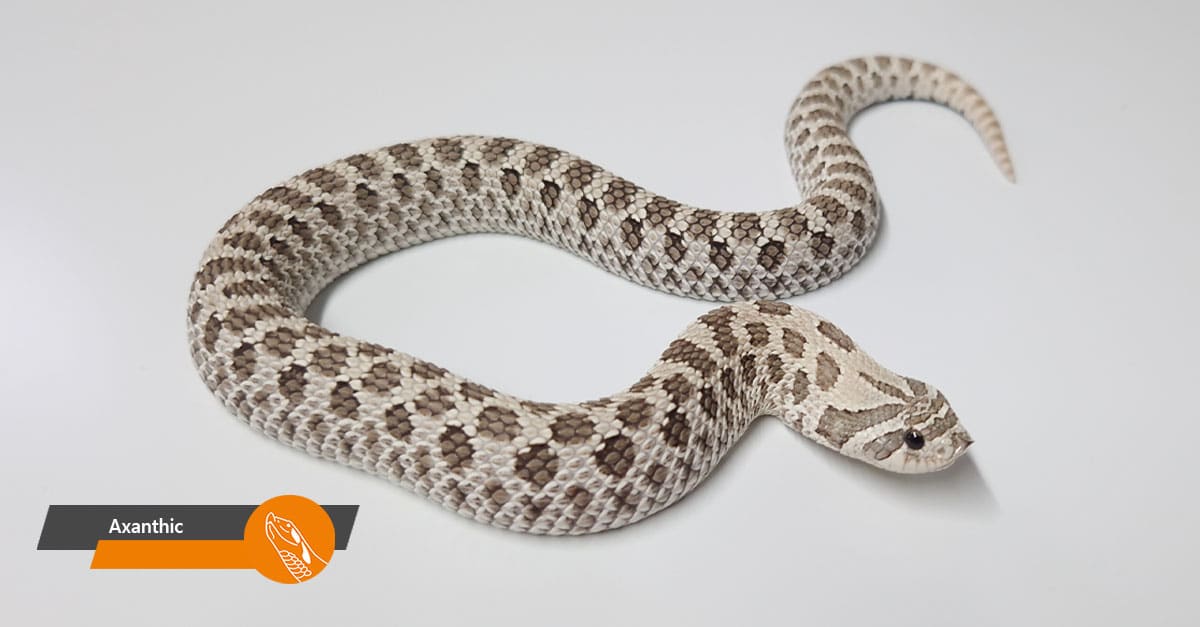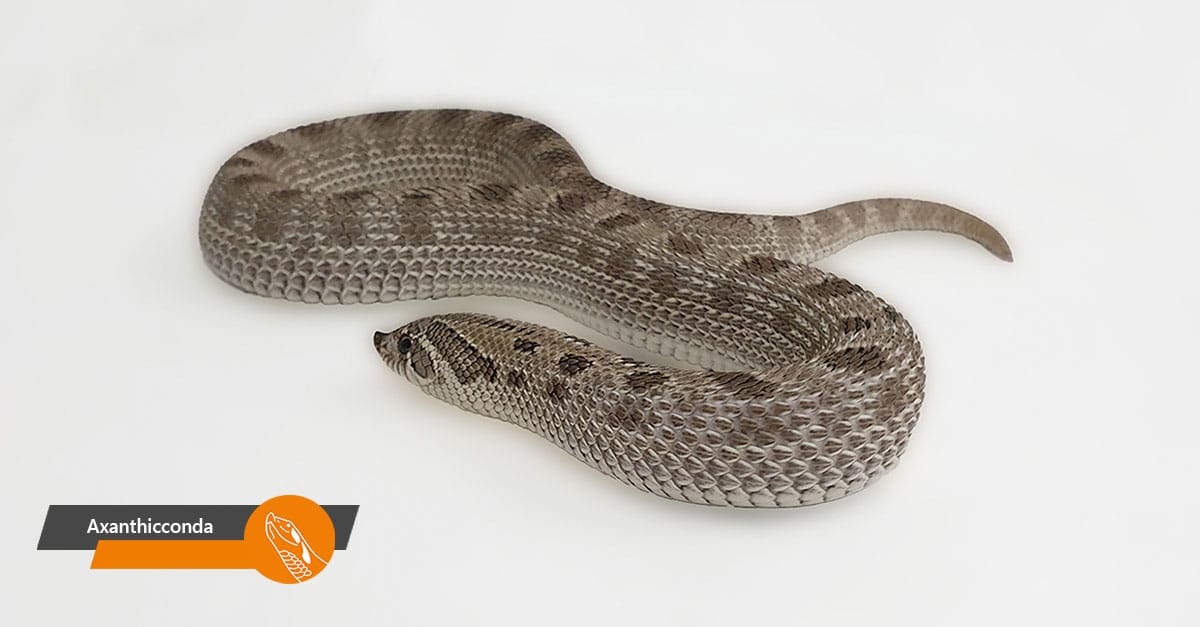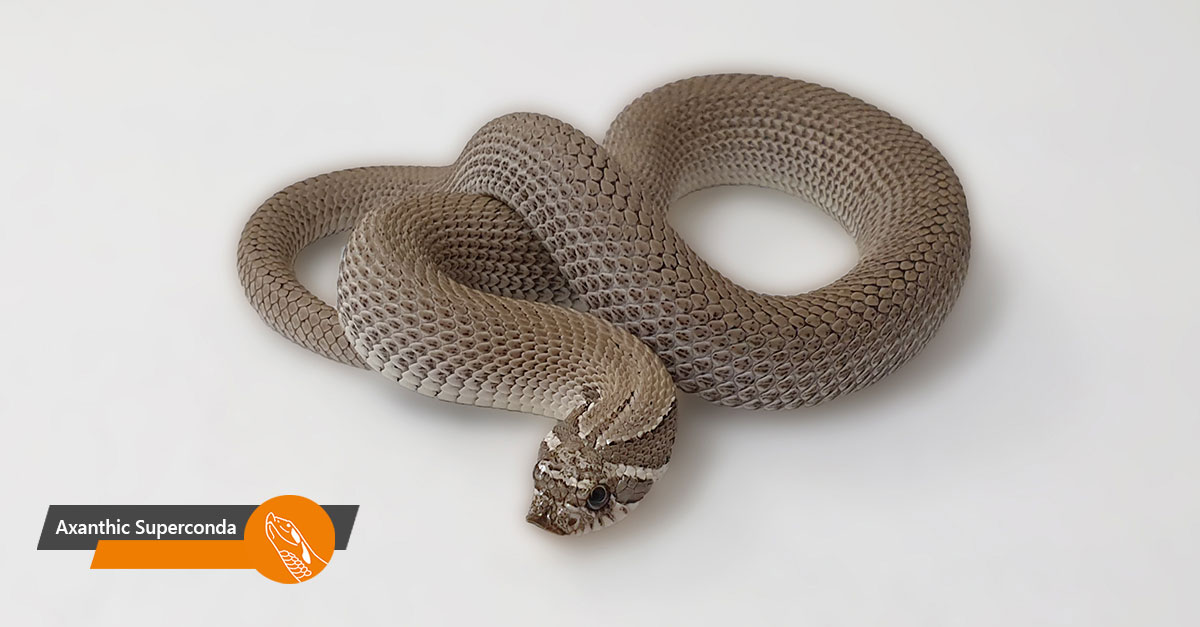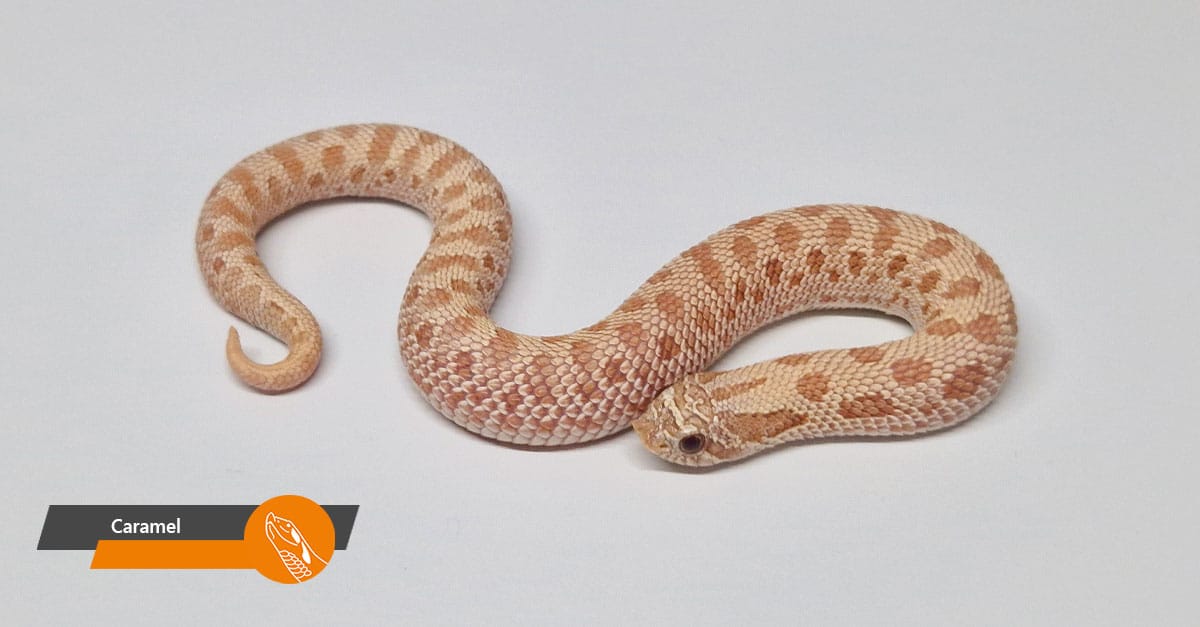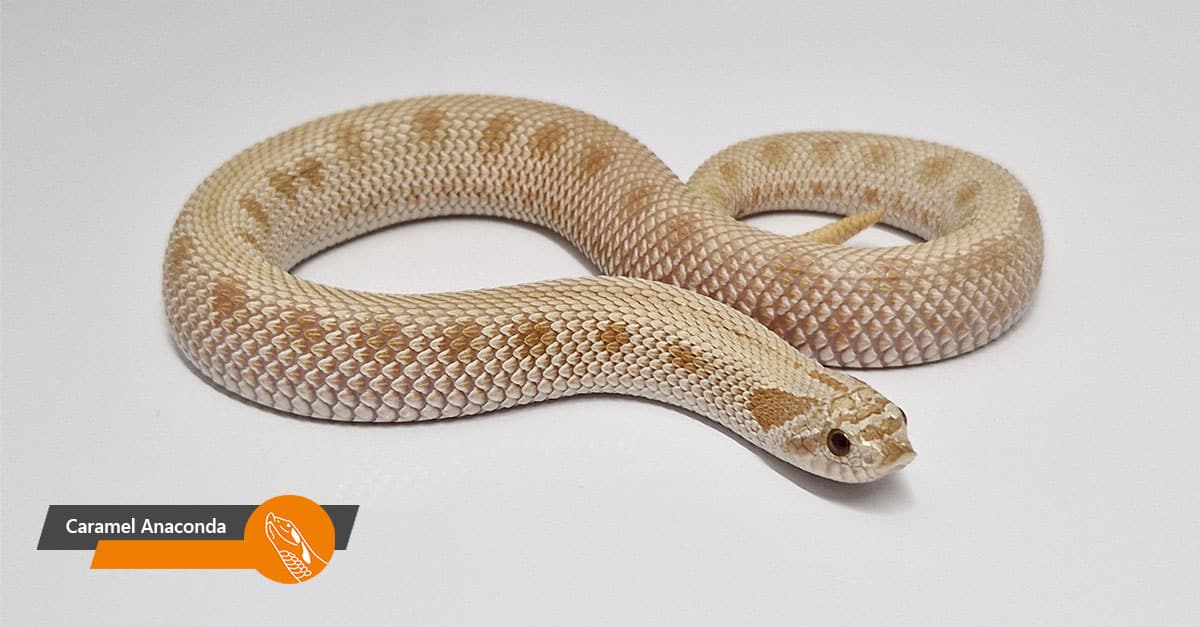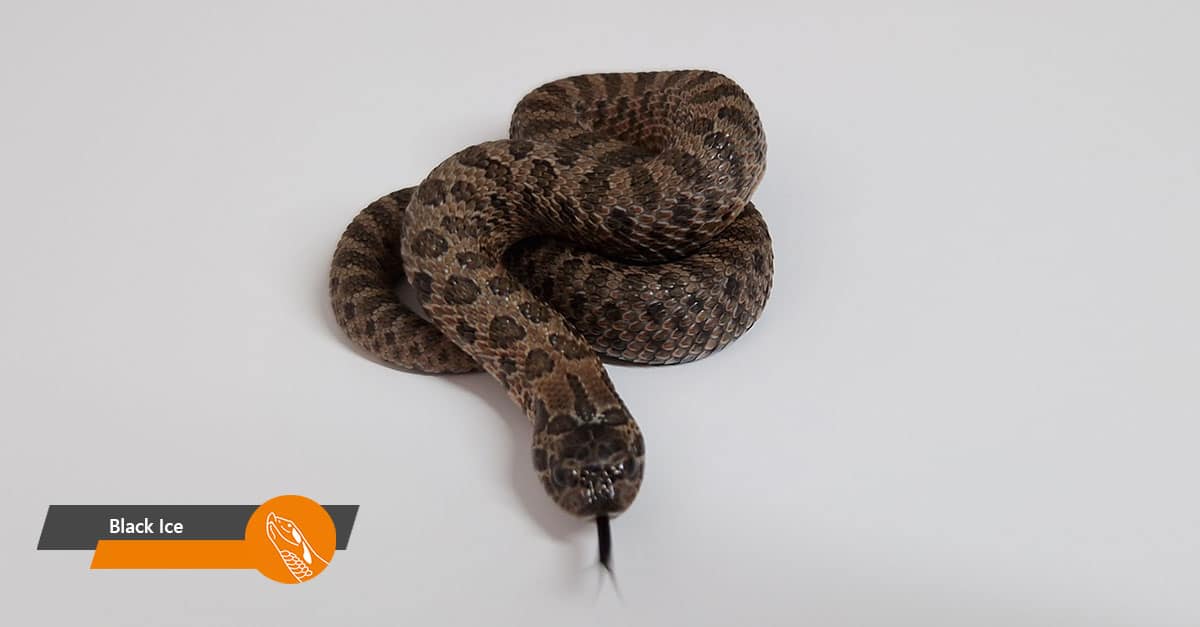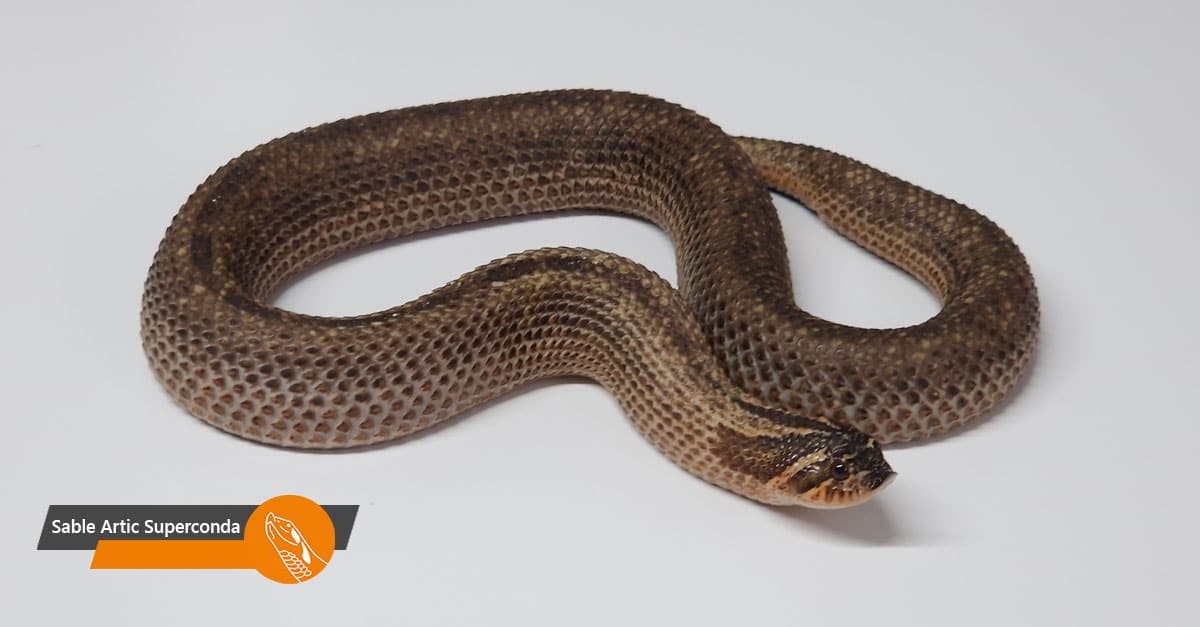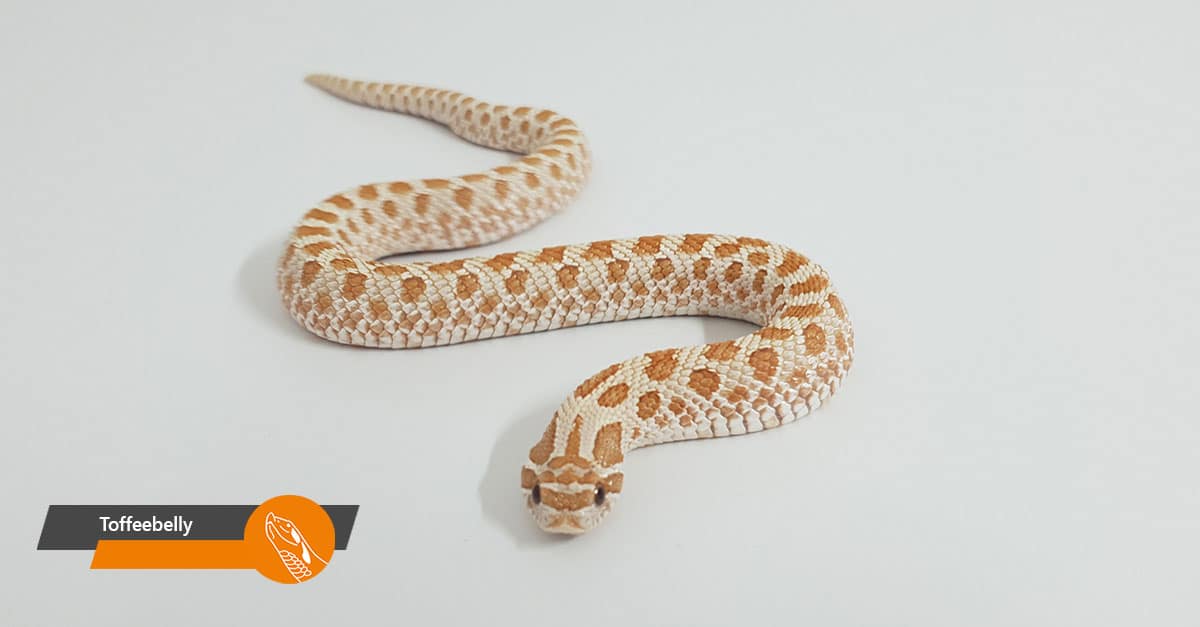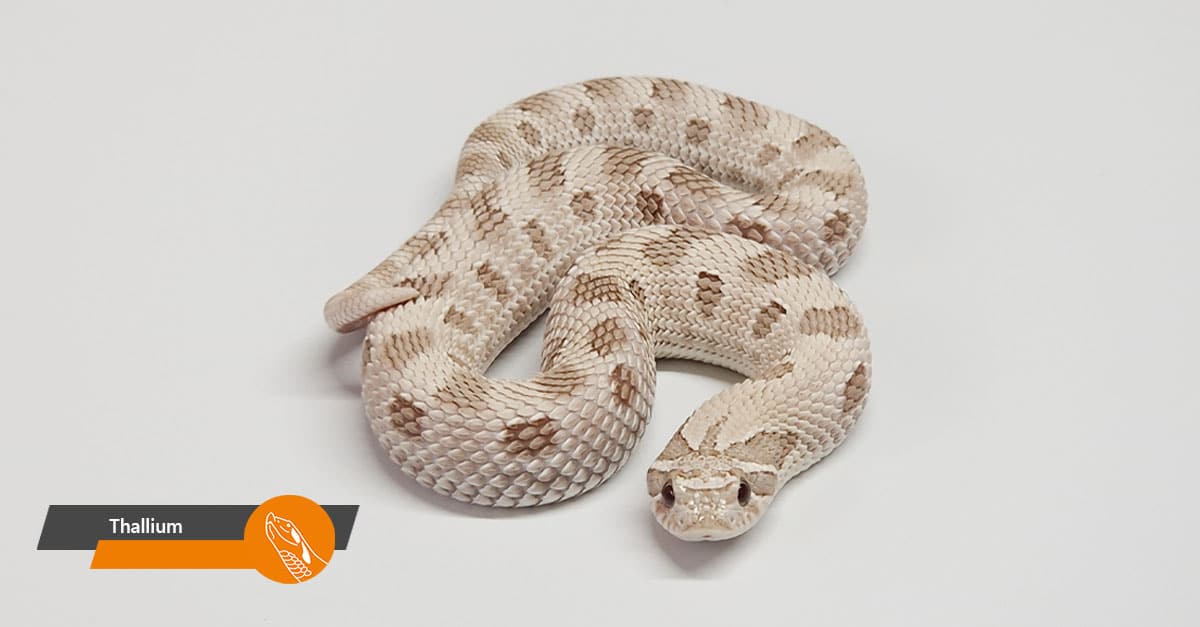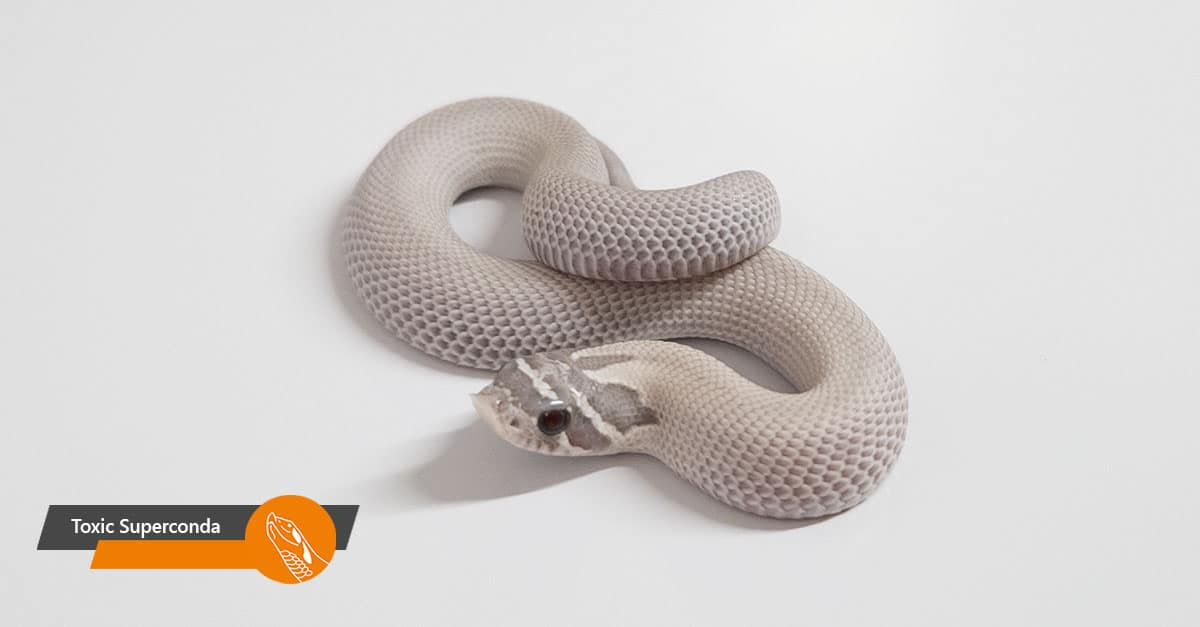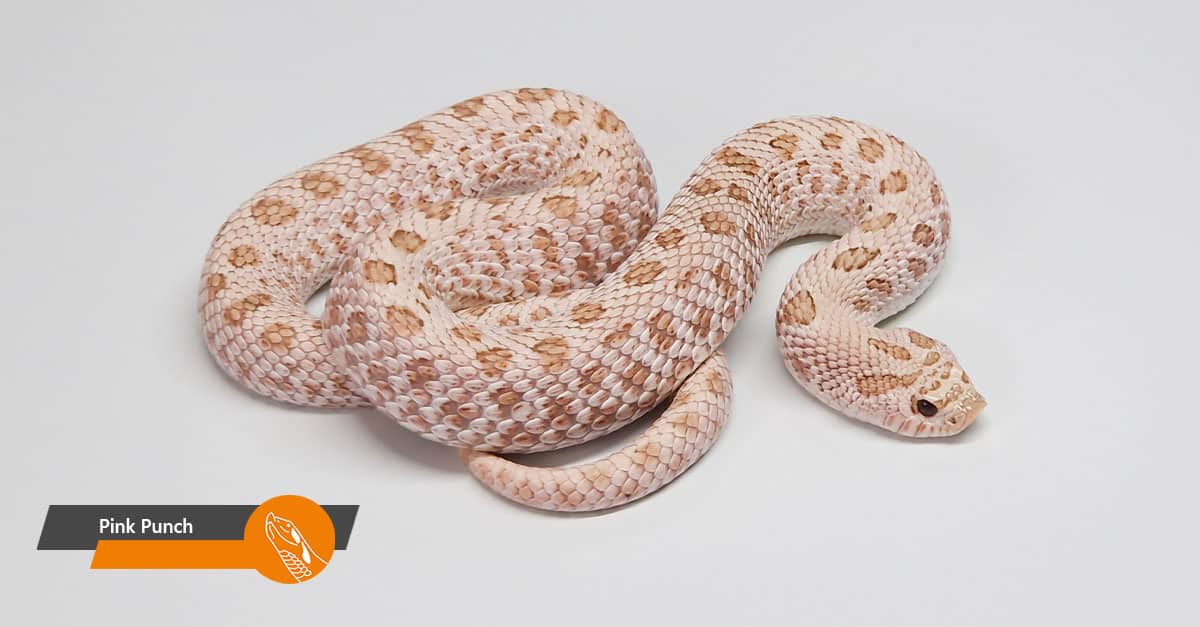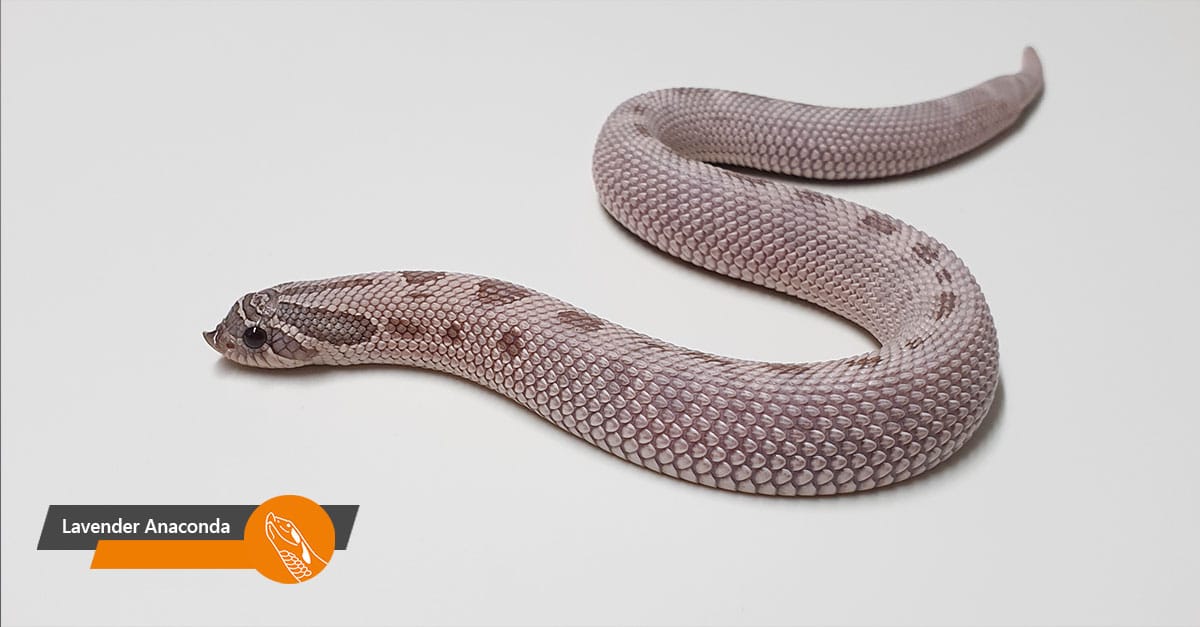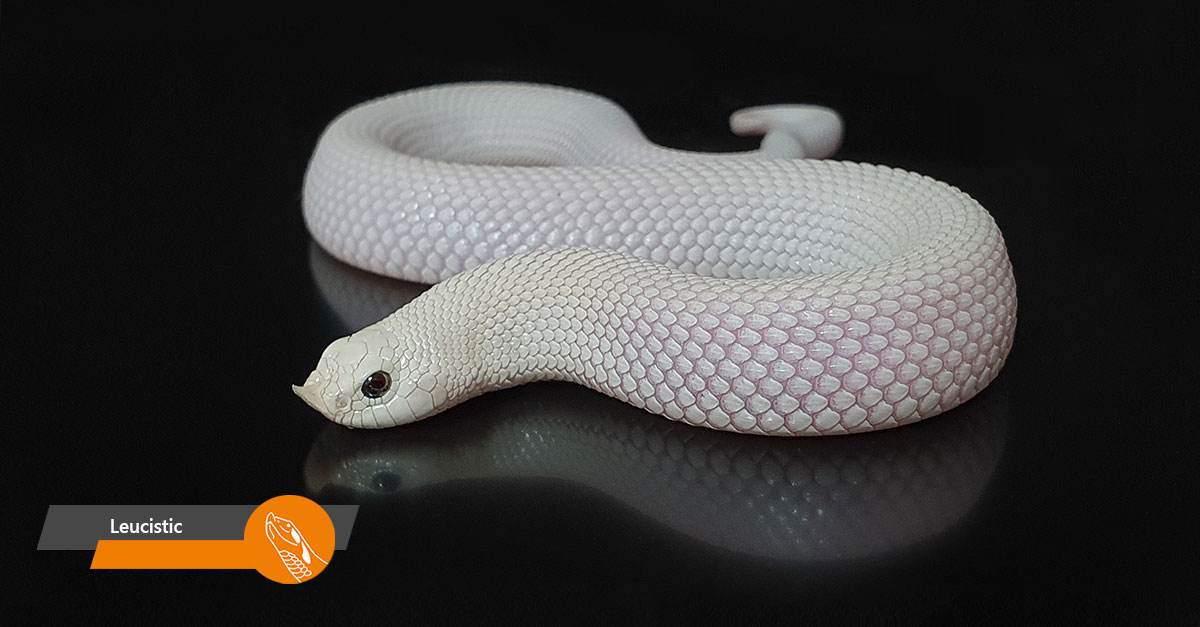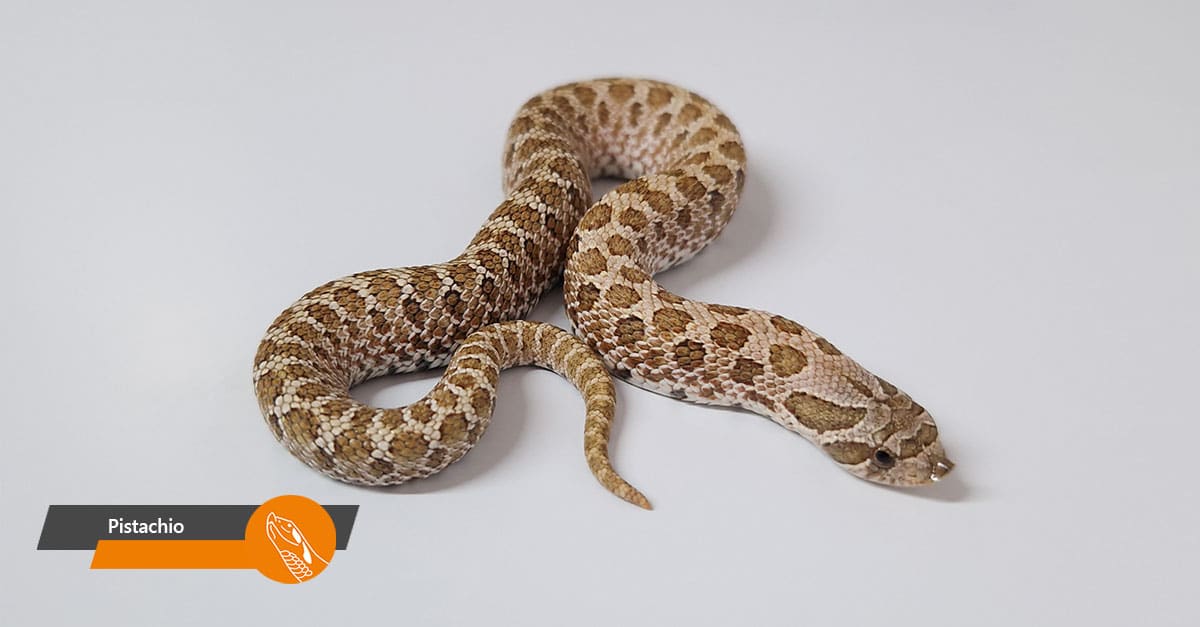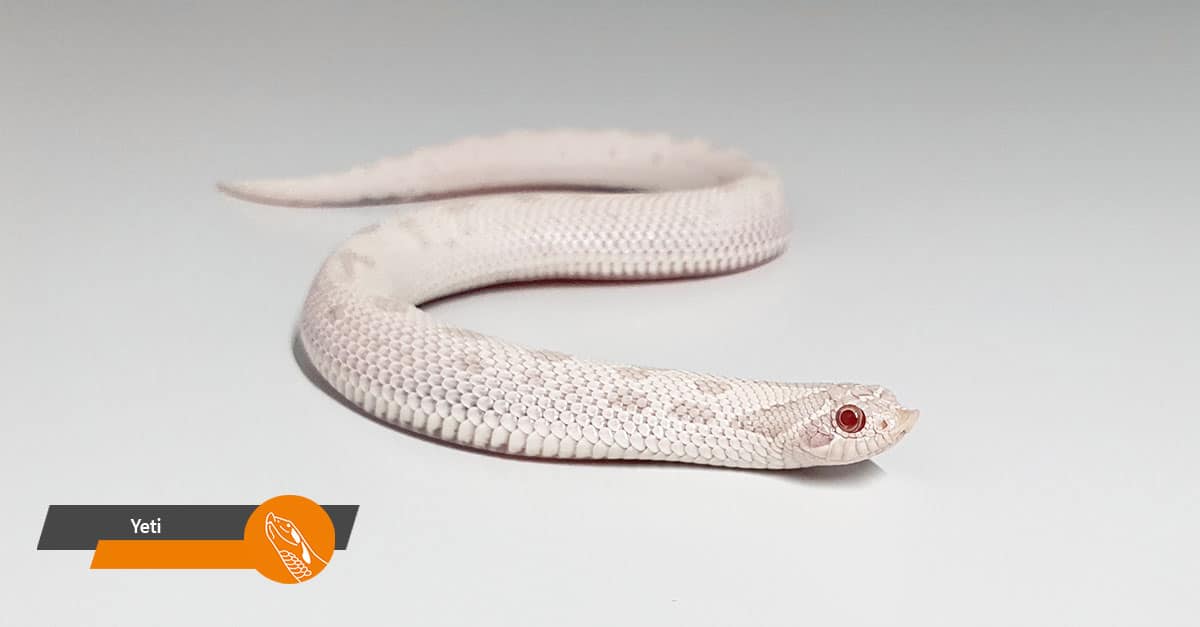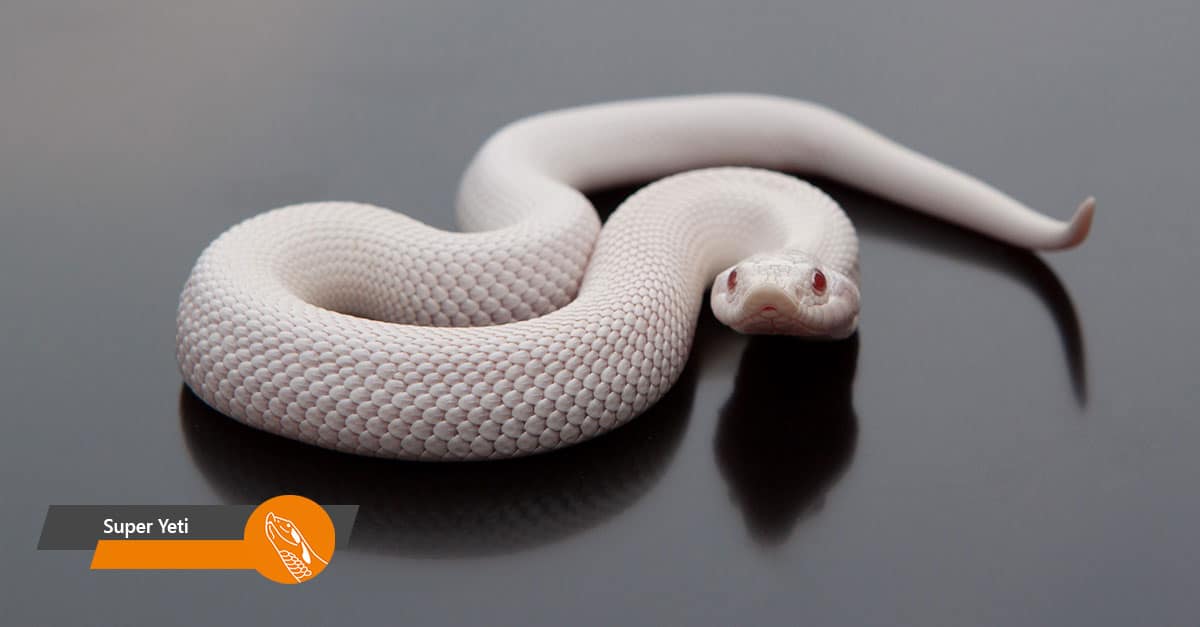Collection
With which morphs are we breeding
Reptifit breeds different morphs of western hognose snakes (Heterodon nasicus nasicus). On this page you can find the morphs we currently keep. Below this text, you can click on one or more buttons with their adequate mutations. If the button turns orange, the corresponding filter is active. Theoretically, all combinations are possible. Unfortunately, we do not own all those combinations.
Normal
Anaconda
Anaconda is an heterozygous incomplete dominant mutation in the pattern of the snake. Many blotches connect with eachother and the side-pattern disappears. The belly has a solid black color, with sometimes an exception at which there are speckles with white borders around them.
When you breed two anacondas with eachother, you will get the homozygous incomplete dominant superconda morph. The superconda morph is recognised with the patternless dorsal and a black belly.
Superconda
When you breed two anacondas with eachother, you will get the homozygous incomplete dominant superconda morph.
Arctic
When you breed two arctics with eachother, you will get the homozygous incomplete dominant superarctic morph. Superarctic stimulates melanin and reduces other pigments, specifically the background pigment.
Grey Fog (Arctic Anaconda)
Grey Fog is a combination of the heterozygous incomplete dominant arctic mutation and the heterozygous incomplete dominant anaconda mutation.
Arctic
When you breed two arctics with eachother, you will get the homozygous incomplete dominant superarctic morph. Superarctic stimulates melanin and reduces other pigments, specifically the background pigment.
Anaconda
Anaconda is an heterozygous incomplete dominant mutation in the pattern of the snake. Many blotches connect with eachother and the side-pattern disappears. The belly has a solid black color, with sometimes an exception at which there are speckles with white borders around them.
When you breed two anacondas with eachother, you will get the homozygous incomplete dominant superconda morph. The superconda morph is recognised with the patternless dorsal and a black belly.
Platinum (Arctic Superconda)
Arctic
When you breed two arctics with eachother, you will get the homozygous incomplete dominant superarctic morph. Superarctic stimulates melanin and reduces other pigments, specifically the background pigment.
Superconda
When you breed two anacondas with eachother, you will get the homozygous incomplete dominant superconda morph.
Superarctic
Superarctic is an homozygous incomplete dominant mutation in the pattern and color of the snake. Superarctic stimulates melanin and reduces other pigments, specifically the background pigment. The mutation is recognised by its white background with pink or tan skin and brown to gray blotches with big concentrations of melanin. Superarctics have a reduced head pattern. With each shed they become lighter in color. When they get out of the eggs, they look nearly fully black. After a couple of sheds they look as in the picture. When you breed two heterozygous incomplete dominant arctic snakes, you will get the superarctic morph.
Superarctic Anaconda
Superarctic Anaconda is a combination of the homozygous incomplete dominant superarctic mutation and the heterozygous incomplete dominant anaconda mutation. This combination often has arranged dots on the back, but there can also be a considerable amount of lack in pattern. Since this combination contains the superarctic morph the colour changes drastically with the first couple of sheds.
Anaconda
Anaconda is an heterozygous incomplete dominant mutation in the pattern of the snake. Many blotches connect with eachother and the side-pattern disappears. The belly has a solid black color, with sometimes an exception at which there are speckles with white borders around them.
When you breed two anacondas with eachother, you will get the homozygous incomplete dominant superconda morph. The superconda morph is recognised with the patternless dorsal and a black belly.
Superartic
Superarctic Superconda
Superarctic Superconda is a combination of the homozygous incomplete dominant superarctic mutation and the heterozygous incomplete dominant superconda mutation. This combination often has a full stripe or absolutely no pattern on the back. Since this combination contains the superarctic morph the colour changes drastically with the first couple of sheds. They change from all black hatchlings to white snakes with black head pattern.
Superconda
Superconda is a homozygous incomplete dominant mutation in the pattern of the snake. This mutation is recognised by the patternless dorsal and can have a stripe from the head.
When you breed two anacondas with eachother, you will get the homozygous incomplete dominant superconda morph.
Superartic
Albino
The Albino morph is a recessive mutation and is the most common morph. An albino has a lack of melanin. The lack of melanin makes it that the snake has less brown-black pigmentation and that snake gets a red, orange or yellow color. You can recognise an albino with its red eyes.
Albino Anaconda
Albino Anaconda is a mix of the recessive albino mutation and the heterozygous incomplete dominant anaconda mutation. This combination gives the snake the albino colouration with cleaner/less pattern. The anaconda morph is able the give the snake a lighter and whiter background colour.
Albino
Anaconda
When you breed two Anacondas with eachother, you will get the homozygous incomplete dominant Superconda morph. The Superconda morph is recognised with the patternless dorsal and a black belly.
Albino Superconda
Albino Superconda is a combination of the recessive albino mutation and the homozygous incomplete dominant superconda mutation. This combination gives the snake the albino colouration with no pattern on the dorsal scales.
Albino
De albino mutatie is een recessieve mutatie en is de meest voorkomende mutatie onder de slangen. Bij een albino is er geen melanine aanwezig. Het melanine tekort zorgt ervoor dat de slang minder bruin-zwart pigment heeft en een rode, oranje of gele kleur krijgt. Een albino is ook vaak te herkennen aan de rood gekleurde ogen.
Superconda
Superconda is a homozygous incomplete dominant mutation in the pattern of the snake. This mutation is recognised by the patternless dorsal and can have a stripe from the head.
When you breed two anacondas with eachother, you will get the homozygous incomplete dominant superconda morph.
Albino Arctic
Albino Arctic is a combination of the recessive albino mutation and the heterozygous incomplete dominant arctic mutation.
Albino
The albino morph is a recessive mutation and is the most common morph. An albino has a lack of melanin. The lack of melanin makes it that the snake has less brown-black pigmentation and that snake gets a red, orange or yellow color. You can recognise an albino with its red eyes.
Arctic
When you breed two arctics with eachother, you will get the homozygous incomplete dominant superarctic morph. Superarctic stimulates melanin and reduces other pigments, specifically the background pigment.
Albino Arctic Anaconda
Albino Arctic Anaconda is a combination of the recessive albino mutation, the heterozygous incomplete dominant arctic mutation and the heterozygous incomplete dominant anaconda mutation.
Albino
Arctic
Arctic is an heterozygous incomplete dominant mutation. Arctics get lighter with every shed.
When you breed two arctics with eachother, you will get the homozygous incomplete dominant superarctic morph. Superarctic stimulates melanin and reduces other pigments, specifically the background pigment.
Anaconda
When you breed two Anacondas with eachother, you will get the homozygous incomplete dominant Superconda morph. The Superconda morph is recognised with the patternless dorsal and a black belly.
Subzero (Albino Superartic)
Subzero is a combination of the recessive albino mutation and the homozygous incomplete dominant superarctic mutation. This combination gives the snake a pink coulour with solid red eyes and a pink translucent belly. Some subzeros have purple patches/stripes on their back.
Albino
Superartic
Super Daddy (Albino Superartic Superconda)
Super Daddy is a combination of the recessive albino mutation, the homozygous incomplete dominant superarctic mutation and the homozygous incomplete dominant superconda mutation. This combination, like a normal superarctic superconda, has no dorsal pattern. However they sometimes have a purple/pink stripe along the dorsal scales.
Albino
Superartic
Superconda
Superconda is a homozygous incomplete dominant mutation in the pattern of the snake. This mutation is recognised by the patternless dorsal and can have a stripe from the head.
When you breed two anacondas with eachother, you will get the homozygous incomplete dominant superconda morph.
Pink Pastel Albino
Pink Pastel Albino is a recessive mutation and is often referred to as PPA. Pink Pastel Albino is a T- albino form. As hatchlings they start out reddish and become pink over time. This mutation proved difficult to breed and had multiple genetic defects, such as stargazing, spinal kinks, enlarged heads, dwarfism, eye-less-ness, etc. Nowadays breeders made this mutation healthier by outcrossing. This mutation is a completely different mutation than the regular albino.
Electric (Albino Pink Pastel Albino)
Electric is a combination of the recessive Albino mutation and the recessive Pink Pastel Albino mutation. This combination has a bright orange/pink colour with lightly coloured red eyes. Hatchlings start out very bright and as they age get a lighter salmony background colour with striking pink saddles and an orange tint. This gives them a contrasted pink look.
Albino
Pink Pastel Albino
Pink Pastel Albino is a recessive mutation and is often referred to as PPA. Pink Pastel Albino is a T- albino form. As hatchlings they start out reddish and become pink over time. This mutation proved difficult to breed and had multiple genetic defects, such as stargazing, spinal kinks, enlarged heads, dwarfism, eye-less-ness, etc. Nowadays breeders made this mutation healthier by outcrossing. This mutation is a completely different mutation than the regular albino.
Axanthic
Axanthic is a recessive mutation with a lack of red and yellow pigmentation. The snakes have shades of white, grey and black. The belly of the axanthic also misses the yellow, red or orange pigmentation.
Axanthic Anaconda
Axanthic Anaconda is a combination of the recessive axanthic mutation and the heterozygous incomplete dominant anaconda mutation. The axanthic mutation makes the color and the anaconda mutation makes the pattern.
Axanthic
Axanthic is a recessive mutation with a lack of red and yellow pigmentation. The snakes have shades of white, grey and black. The belly of the axanthic also misses the yellow, red or orange pigmentation.
Anaconda
Anaconda is an heterozygous incomplete dominant mutation in the pattern of the snake. Many blotches connect with eachother and the side-pattern disappears. The belly has a solid black color, with sometimes an exception at which there are speckles with white borders around them.
When you breed two anacondas with eachother, you will get the homozygous incomplete dominant superconda morph. The superconda morph is recognised with the patternless dorsal and a black belly.
Axanthic Superconda
Axanthic
Axanthic is a recessive mutation with a lack of red and yellow pigmentation. The snakes have shades of white, grey and black. The belly of the axanthic also misses the yellow, red or orange pigmentation.
Superconda
Superconda is a homozygous incomplete dominant mutation in the pattern of the snake. This mutation is recognised by the patternless dorsal and can have a stripe from the head.
When you breed two anacondas with eachother, you will get the homozygous incomplete dominant superconda morph.
Caramel
Caramel is a recessive color mutation. Caramel is the cleanest form of T+ albino and displays no black markings. Caramels are creamy colored with pink markings. The eyes and tongue are both ruby pink colored. The belly pattern is almost entirely absent, this makes the belly ivory-cream colored. Caramels also have reduced neck pattern and strong whitewalls on the ventral.
Caramel Anaconda
Caramel Anaconda is a combination of the recessive caramel mutation and the heterozygous incomplete dominant anaconda mutation. The caramel mutation makes the color and the anaconda mutation makes the pattern. The caramel anaconda combination is recognised by its reduced head pattern and almost absent and clean ventral pattern.
Caramel
Caramel is a recessive color mutation. Caramel is the cleanest form of T+ albino and displays no black markings. Caramels are creamy colored with pink markings. The eyes and tongue are both ruby pink colored. The belly pattern is almost entirely absent, this makes the belly ivory-cream colored. Caramels also have reduced neck pattern and strong whitewalls on the ventral.
Anaconda
Anaconda is an heterozygous incomplete dominant mutation in the pattern of the snake. Many blotches connect with eachother and the side-pattern disappears. The belly has a solid black color, with sometimes an exception at which there are speckles with white borders around them.
When you breed two anacondas with eachother, you will get the homozygous incomplete dominant superconda morph. The superconda morph is recognised with the patternless dorsal and a black belly.
Cinnamon Anaconda
Cinnamon
Anaconda
Anaconda is an heterozygous incomplete dominant mutation in the pattern of the snake. Many blotches connect with eachother and the side-pattern disappears. The belly has a solid black color, with sometimes an exception at which there are speckles with white borders around them.
When you breed two anacondas with eachother, you will get the homozygous incomplete dominant superconda morph. The superconda morph is recognised with the patternless dorsal and a black belly.
Extreme Red Albino Cinnamon Anaconda
Albino
Cinnamon
Anaconda
Anaconda is an heterozygous incomplete dominant mutation in the pattern of the snake. Many blotches connect with eachother and the side-pattern disappears. The belly has a solid black color, with sometimes an exception at which there are speckles with white borders around them.
When you breed two anacondas with eachother, you will get the homozygous incomplete dominant superconda morph. The superconda morph is recognised with the patternless dorsal and a black belly.
Sable
Sable is a recessive colour mutation that accelerates melanin production as well as all other chromatophores. The sable gene increasingly gets darker with age, resulting in some eventually turning nearly solid black. Sables show an increased amount of iridescence compared to other morphs. Iridophores are responsible for the reflective qualities and hues.
Black Ice (Sable Arctic)
Black Ice is a combination of the recessive sable mutation and the heterozygous incomplete dominant arctic mutation. This combination gives the snake the brown sable colouration with darker borders around the saddles and visible eyebrows. With younger snakes the arctic mutation seems to give a more lighter colouration with more reddish and greenish hues. With age the snake will get darker and the saddles will get black.
Sable
Sable is a recessive colour mutation that accelerates melanin production as well as all other chromatophores. The sable gene increasingly gets darker with age, resulting in some eventually turning nearly solid black. Sables show an increased amount of iridescence compared to other morphs. Iridophores are responsible for the reflective qualities and hues.
Arctic
Arctic is an heterozygous incomplete dominant mutation. Arctics get lighter with every shed.
When you breed two arctics with eachother, you will get the homozygous incomplete dominant superarctic morph. Superarctic stimulates melanin and reduces other pigments, specifically the background pigment.
Sable Arctic Superconda
Sable Arctic Superconda is a mix of the recessive sable mutation, the heterozygous incomplete dominant arctic mutation and the homozygous incomplete dominant superconda mutation. This combination gives the snake the brown sable colouration. With hatchlings snakes the arctic mutation seems to give a more lighter colouration with more reddish and greenish hues. With age the snake will get darker and the present pattern will get black. The superconda mutation gives the snake a complete lack of dorsal pattern.
Sable
Sable is een recessieve mutatie die de productie van melanine en alle andere chromatoforen versnelt. Sables worden, naarmate ze ouder worden, steeds donkerder. Dit zorgt ervoor dat sommigen uiteindelijk bijna volledig zwart worden. Sables vertonen een grotere hoeveelheid aan iridoforen in vergelijking met andere morphs. Iridoforen zijn verantwoordelijk voor de reflecterende eigenschappen en tinten.
Arctic
Arctic is an heterozygous incomplete dominant mutation. Arctics get lighter with every shed.
When you breed two arctics with eachother, you will get the homozygous incomplete dominant superarctic morph. Superarctic stimulates melanin and reduces other pigments, specifically the background pigment.
Superconda
Superconda is a homozygous incomplete dominant mutation in the pattern of the snake. This mutation is recognised by the patternless dorsal and can have a stripe from the head.
When you breed two anacondas with eachother, you will get the homozygous incomplete dominant superconda morph.
Swiss Chocolate
Swiss Chocolate is a recessive colour mutation that accelerates melanin production. Swiss chocolate has a higher concentration of melanin on the head than on the rest of the body. This gives the head a dark colouration. Swiss chocolate hatch out pretty dark and keep that dark colour troughout their life. Swiss chocolates have more colours on the yellow spectrum with a more pixelated background, whereas sables have more colours on the green spectrum.
Toffeebelly
Toffeebelly is a recessive mutation with a lack of melanin (T+ Albino) except in some rare paradox spots. The name “toffeebelly” was chosen because of the toffee colored belly. Toffeebellys often have a light gold-brownish color. However, often there are a lot more shades in clutch. These colors vary from green, red, orange and yellow shades.
Toffeeconda (Toffeebelly Anaconda)
Toffeebelly
Toffeebelly is a recessive mutation with a lack of melanin (T+ Albino) except in some rare paradox spots. The name “toffeebelly” was chosen because of the toffee colored belly. Toffeebellys often have a light gold-brownish color. However, often there are a lot more shades in clutch. These colors vary from green, red, orange and yellow shades.
Anaconda
Anaconda is an heterozygous incomplete dominant mutation in the pattern of the snake. Many blotches connect with eachother and the side-pattern disappears. The belly has a solid black color, with sometimes an exception at which there are speckles with white borders around them.
When you breed two anacondas with eachother, you will get the homozygous incomplete dominant superconda morph. The superconda morph is recognised with the patternless dorsal and a black belly.
Candy (Toffeebelly Superconda)
Toffeebelly
Superconda
When you breed two anacondas with eachother, you will get the homozygous incomplete dominant superconda morph.
Thallium (Axanthic Toffeebelly Anaconda)
Thallium is a combination of the recessive axanthic mutation, the recessive toffeebelly mutation and the heterozygous incomplete dominant anaconda mutation. This combination has a silver/grey to creamish colour. The anaconda mutation removes some of the pattern.
Axanthic
Axanthic is a recessive mutation with a lack of red and yellow pigmentation. The snakes have shades of white, grey and black. The belly of the axanthic also misses the yellow, red or orange pigmentation.
Toffeebelly
Toffeebelly is a recessive mutation with a lack of melanin (T+ Albino) except in some rare paradox spots. The name “toffeebelly” was chosen because of the toffee colored belly. Toffeebellys often have a light gold-brownish color. However, often there are a lot more shades in clutch. These colors vary from green, red, orange and yellow shades.
Anaconda
Anaconda is an heterozygous incomplete dominant mutation in the pattern of the snake. Many blotches connect with eachother and the side-pattern disappears. The belly has a solid black color, with sometimes an exception at which there are speckles with white borders around them.
When you breed two anacondas with eachother, you will get the homozygous incomplete dominant superconda morph. The superconda morph is recognised with the patternless dorsal and a black belly.
Toxic Superconda (Axanthic Toffeebelly Superconda)
Toxic Superconda is a combination of the recessive axanthic mutation, the recessive toffeebelly mutation and the homozygous incomplete dominant superconda mutation. This combination has a silver/grey to creamish colour. The superconda mutation removes the dorsal pattern.
Axanthic
Axanthic is a recessive mutation with a lack of red and yellow pigmentation. The snakes have shades of white, grey and black. The belly of the axanthic also misses the yellow, red or orange pigmentation.
Toffeebelly
Superconda
When you breed two anacondas with eachother, you will get the homozygous incomplete dominant superconda morph.
Pink Punch (Toffeebelly Superarctic)
Pink Punch is a combination of the recessive toffeebelly mutation and the homozygous incomplete dominant superarctic mutation. This combination gives the snake a brownish/ purplish coulour with solid dark red eyes. The older this combination gets the lighter the colours get.
Toffeebelly
Toffeebelly is een recessieve mutatie met een vermindering van melanine (T+ Albino) behalve op enkele zeldzame paradox vlekken. De naam “toffeebelly” is gekozen vanwege de toffee gekleurde buik. Toffeebelly’s hebben vaak een licht goud-bruinige kleur. Echter zijn er vaak meerdere tinten in een legsel te vinden, zo heb je groene, rode, oranje en gele tinten.
Superarctic
Superarctic is an homozygous incomplete dominant mutation in the pattern and color of the snake. Superarctic stimulates melanin and reduces other pigments, specifically the background pigment. The mutation is recognised by its white background with pink or tan skin and brown to gray blotches with big concentrations of melanin. Superarctics have a reduced head pattern. With each shed they become lighter in color. When they get out of the eggs, they look nearly fully black. After a couple of sheds they look as in the picture. When you breed two heterozygous incomplete dominant arctic snakes, you will get the superarctic morph.
Lavender
Lavender is a recessive color mutation and a T+ form of albino. Lavenders start out as almost red neonates with dark bellies. After two or three sheds, this colour softens as the snake takes on a more pink-lavender like colour. Lavenders have dark ruby eyes. When lavenders are stressed they darken their colour. This has to do with an increased upward flow of melanin towards the melanophores.
Lavender Anaconda
Lavender Anaconda is a combination of the recessive lavender mutation and the heterozygous incomplete dominant anaconda mutation. The lavender mutation makes the colour and the anaconda mutation makes the pattern. The combination of lavender and anaconda makes the snake have less pattern on the upper layer, which makes it possible to see a more faded pattern. Their true colour is incredibly hard to capture on camera.
Lavender
Lavender is a recessive color mutation and a T+ form of albino. Lavenders start out as almost red neonates with dark bellies. After two or three sheds, this colour softens as the snake takes on a more pink-lavender like colour. Lavenders have dark ruby eyes. When lavenders are stressed they darken their colour. This has to do with an increased upward flow of melanin towards the melanophores.
Anaconda
Anaconda is an heterozygous incomplete dominant mutation in the pattern of the snake. Many blotches connect with eachother and the side-pattern disappears. The belly has a solid black color, with sometimes an exception at which there are speckles with white borders around them.
When you breed two anacondas with eachother, you will get the homozygous incomplete dominant superconda morph. The superconda morph is recognised with the patternless dorsal and a black belly.
Coral (Lavender Albino)
Coral is a combination of the recessive albino mutation and the recessive lavender mutation. This combination gives the snake a pink colour with red eyes. The saddles can have a tint that is somewhere between orange and pink.
Albino
The albino morph is a recessive mutation and is the most common morph. An albino has a lack of melanin. The lack of melanin makes it that the snake has less brown-black pigmentation and that snake gets a red, orange or yellow color. You can recognise an albino with its red eyes.
Lavender
Lavender is een recessieve kleurmutatie en een T+ vorm van albino. Jonge lavenders beginnen als bijna rode slangen met donkere buiken. Na twee of drie vervellingen wordt deze kleur zachter, hierdoor neemt de slang een meer roze-lavendelachtige kleur aan. Lavenders hebben donkere robijnrode ogen. Wanneer lavenders al een kleine mate van stress krijgen, wordt hun kleur donkerder. Dit heeft te maken met een verhoogde opwaartse stroom van melanine naar de melanoforen.
Leucistic
Leucistic is a recessive mutation. Leucistics do not have any pigmentation, expect in their eyes. This makes it that the snake has no pattern, is white coloured and has black or blue coloured eyes. In combinations it is only possible to change the eye colour and not their scale colour. This is done by making combinations with other mutations, like albino or caramel.
Pistachio
Pistachio is a recessive colour mutation and a T+ albino form. This mutation affects the ventral and dorsal colouration. It has green hues. Their background colour is a clean, light khaki with greenish to mustard brown-yellow colour and has no visible black. Some pistachios have orange coloured ventral markings. They a have dark lavender coloured belly with yellow patches.
Yeti (Snow Anaconda)
Yeti is a combination of the recessive albino mutation, the recessive axanthic mutation, and the homozygous incomplete dominant anaconda mutation. The albino and axanthic mutations make the white base colour and pink/grey pattern colour. The anaconda mutation makes makes the pattern.
Abino
Axanthic
Axanthic is a recessive mutation with a lack of red and yellow pigmentation. The snakes have shades of white, grey and black. The belly of the axanthic also misses the yellow, red or orange pigmentation.
Anaconda
Anaconda is an heterozygous incomplete dominant mutation in the pattern of the snake. Many blotches connect with eachother and the side-pattern disappears. The belly has a solid black color, with sometimes an exception at which there are speckles with white borders around them.
When you breed two anacondas with eachother, you will get the homozygous incomplete dominant superconda morph. The superconda morph is recognised with the patternless dorsal and a black belly.
Super Yeti (Snow superconda)
Super Yeti is a combination of the recessive albino mutation, the recessive axanthic mutation, and the homozygous incomplete dominant superconda mutation. The albino and axanthic mutations make the white base colour and pink/grey pattern colour. The superconda mutation makes it so that there is no dorsal pattern.
Abino
Axanthic
Axanthic is a recessive mutation with a lack of red and yellow pigmentation. The snakes have shades of white, grey and black. The belly of the axanthic also misses the yellow, red or orange pigmentation.
Superconda
When you breed two anacondas with eachother, you will get the homozygous incomplete dominant superconda morph.


